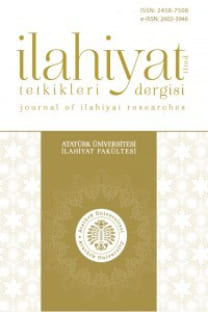KUR’ÂN’DA PEYGAMBERLERİN İSMETİ / Security from Vices of Prophets in the Koran
ÖZET İsmet sıfatı, peygamberlerin, Allah tarafından, kötülük yapma, günah isleme ve yalan söyleme hususunda korunduğunu ifade eder. Bu sıfat, peygamberler için zaruri ve gerekli bir şeydir. Eğer peygamberler günah işleselerdi, Allah onlara uymayı emretmezdi. Çünkü Allah kullarına günah islemeyi emretmez. Allah peygamberleri örnek alıp onlara uyulmasını emrettiğine göre peygamberlerin her türlü günahtan uzak bulunmaları aklın ve dinin bir gereğidir. Şayet peygamberlerin günah islemeleri caiz olsaydı, o takdirde ümmet için de günah islemek meşru ve mübah olurdu. Allah, melek vasıtasıyla peygamberlerine gönderdiği vahyi de şeytanın müdahalesinden korumuştur. Dolayısıyla İslam dini masumdur, hata ve tahriften korunmuştur. Onu tebliğ eden Hz. Peygamber de masumdur. Anahtar Kelimeler: İsmet, Masum, Günah İşleme, İrade, Tebliğ Beşeriyet, Mucize,Unutma. ABSTRACT The mudifying adjective attributed to prophets denotes their innocence and inviolability againts vices, sins and falsehood. This attribute is considered to be an essential and indispensible one. If prophets ever committed sins, Allah would not ordain submission and obedience to them. It is a reasonable and religious matter of course that prophets should be free from vices since the faithful are ordered by the divine decree to take the prophets an example and obey their counsels. If prophets are even allowed to commit sins, then it would be lawful for their followers to do the same. On the other hand, the message of Allah revealed to the servants are also protected from the intervention of Satan and accordingly the religion of Islam, being innocent and inviolable, is also protected from any corruption and distortion. Key Words: Security from Vices, Comminting Sins, Innocent, Free Will, Communication of a Message, Humanity, Miracle, Oblivion.
Anahtar Kelimeler:
-
- ISSN: 2458-7508
- Yayın Aralığı: Yılda 2 Sayı
- Başlangıç: 1975
- Yayıncı: Atatürk Üniversitesi İlahiyat Fakültesi
